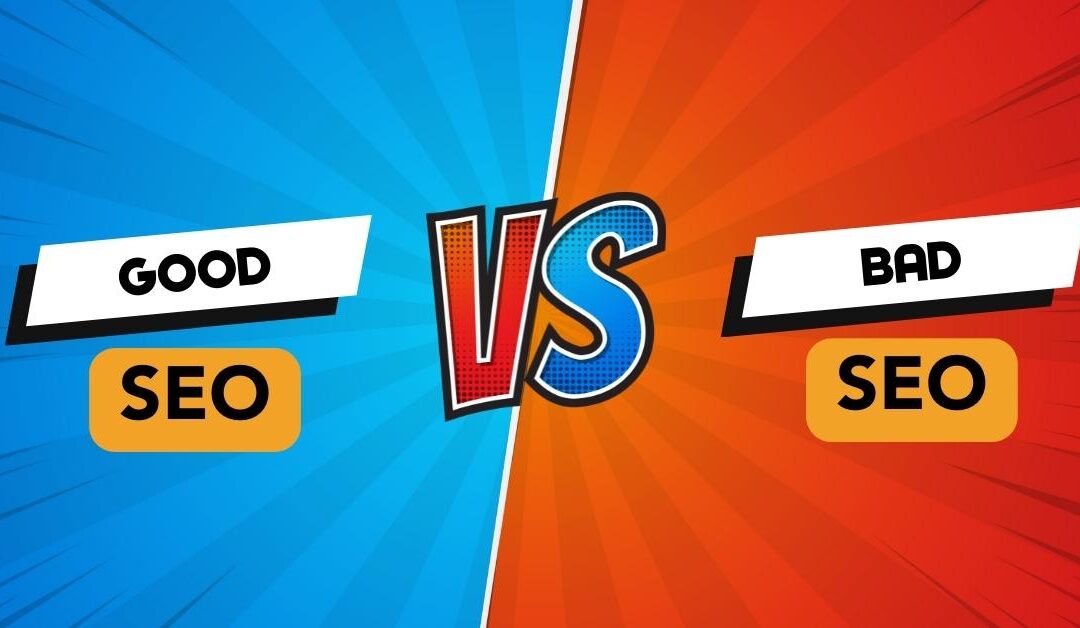Ever since I started up our SEO service, I’ve been very active in the sales cycle at Webology. Getting our team spun-up on selling search engine optimization as a service requires a great deal of ongoing training because prior to 2021, sales focused almost exclusively on social media marketing and social selling. I had to develop our message by listening to what brands want when they’re searching for an SEO vendor. So, when it comes to the question of good SEO vs bad SEO, I have the unique perspective of someone who both does the work and also sells it.
Being active in sales sparked questions on how other marketing companies might rank against Webology in terms of overall SEO performance. In discovery calls, I always get asked the same question. What sets Webology apart from the current agency? I’ll get there, but first let me explain the sales cycle in SEO from an insider’s perspective. I’ve been paid to develop SEO strategies for about 10 years now, and I’ve seen it all. This is what’s wrong with the marketing industry’s approach to selling SEO:
It’s Often Sold Before the Agency Understands How to do The Work
After a bad initial experience with search engine optimization, a brand will typically look for a 2nd opinion from someone like me. I’m usually brought into the conversation around sales when things get serious and the prospect is looking for us to prove our thought leadership on SEO.
Challenge Accepted!
After I go through a high-level audit of the prospect’s website it’s clear there are technical issues, but website issues are NORMAL! I point them out to our prospects like everyone else in the industry, but the reality is some of those issues are low on my priority list after we close the deal and start ACTUAL SEO work. I’m from Alabama, so please forgive me when I say we have bigger fish to fry! I may speak cornbread but I know SEO, and there’s an important point to be made about sales here…
Being able to run an audit and find issues is something that even a ‘bad SEO’ can do very well with the right tools.
Any website can be audited to find real SEO issues in about 2 minutes with a free tool. With over 200 primary ranking factors to consider, you can use data creatively to make any SEO team look either good or bad. The KPIs that matter for the business often get ignored in a sales conversation with some agencies. SEO audits speak in terms of technical SEO, links and content, but they fail to connect specific actions to tangible results in a way you can quantify as a business owner. In other words…
Audits Are Bullshit – but you can schedule one with me here 🤷♂️
So how is a buyer supposed to measure success? Let’s start by understanding which KPIs actually matter before I get into explaining a few more problems I’ve uncovered with the way most agencies approach selling SEO.
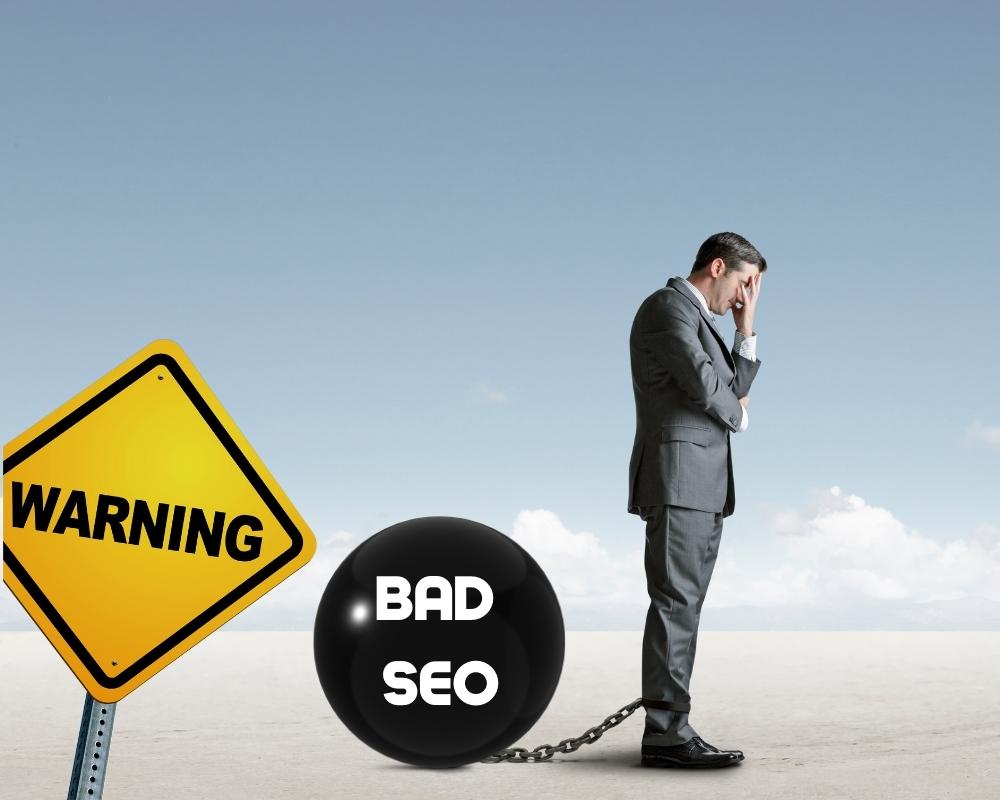
Measuring Success When There’s Always Something to Fix
No website is every truly finished. If you want yours to work for you, it’s constant effort to add quality content and improve user experience. There will always be things your website does well, but in SEO there’s also always room for improvement. In sales, we often focus on what’s not going well when we audit a website for technical issues, but sometimes those issues are not even that important. Having a technical score in the high 90s on SEMrush or AHREFS is not an important SEO metric to follow. Not if you’re in business to make money. After all, is your goal a passing grade or do you want your website pulling in traffic from Google?
Sure the findings of most audits need to be addressed, but ranking for keywords that bring in quality traffic over time is what your business should focus on for SEO. Getting there does involve good technical SEO but if your content’s shit, you should put that audit on the back-burner and hire a good writer first. So when an SEO sales team does an audit for you, remember that anybody can read through a report and tell you what’s wrong. It takes an experienced SEO to figure out how to prioritize the work and if they get it right, traffic numbers will start to move in about 90 days or less.
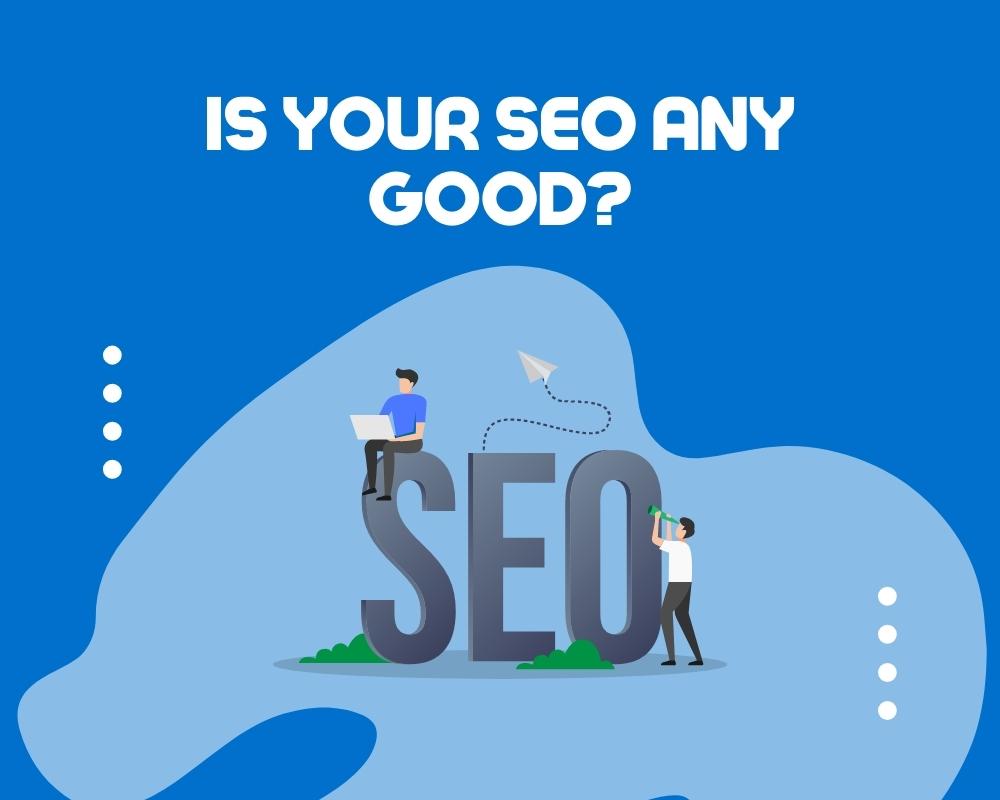
Judge Your SEO by Viewing The Most Data Possible
In my experience, the best way to know if your SEO is either good or bad is to look at the longest timeline of Google Search Console data you can record. If it has a stable trajectory of consistent growth over 90 days or more, your SEO is good overall. Don’t try to make changes based on days or weeks of keyword tracking in the search engine results pages (SERPs). You need at least 90 days of data to really evaluate your SEO results because ranking fluctuations are perfectly normal.
What is Bad SEO?
People want to know if they’re paying for good SEO or bad SEO and the answer to that simple question is tough to quantify, in spite of all the great SEO tools we have to track KPIs and run diagnostics these days. When I first started out in the SEO industry, this wasn’t the case. We didn’t have nearly as many tools at our disposal, but there was still enough out there that anyone could sell SEO without actually knowing how to do the work.
Fake It Until You Make It
I’ve had a lot of opportunities over those years to listen to brands that are frustrated with the lack of results, transparency and accountability in SEO services. Prior to my time here, I did consulting to help with the development of SEO processes at other agencies that were looking to include the service my team’s best at in their offerings for the very first time. They sold it first, then tried to figure out how to do the work…Here’s how that typically goes wrong for everyone:
- Clients start asking about SEO and how they can rank better in search engines like Google.
- Agency owners see the opportunity and find someone that’s ‘not too busy’ on staff to ‘figure out this SEO stuff’
- That person gets overwhelmed for reasons well discuss next and calls in a professional SEO for help
As a consultant in 2019, I’d often get called in to guide the in-house team on creating an SEO system that can consistently rank pages. I’d take their Digital Marketing Director from zero to hero overnight, just by showing them the optimization steps that actually move keywords up the Google ladder faster. I didn’t read blog posts to figure that out, we tested each tactic on live pages and tracked keywords over time.
How Can You Tell if SEO is Bad?
Bad SEO isn’t just limited to the people that spam a search engine with hundreds of spun articles on the same keyword. Your SEO team may follow Google’s webmaster guidelines to a tee and bring a casserole to church each Sunday, but the SEO results can still be bad. The devil’s in the details and more importantly, the data…
Bad SEO Doesn’t Follow Data
That person I mentioned above that got ‘volunTOLD’ to figure out SEO will almost always gravitate towards methods that are as far away from anything resembling ‘black hat’ SEO as possible. Why risk a client’s website and future revenue, after all?
While that may seem like the right move, it tends to develop a mindset that doesn’t question the official source – Google – which has a vested interest in making SEO difficult for all of us. Google wants SEO to be tough, so people are more inclined to resort to paying for ads. I’m not saying there’s anything wrong with that, it’s good business planning!
It’s also the reality you need to understand for your website to be successful and it justifies the need for in-house SEO testing, so that your services actually perform to client expectations.
SEO isn’t about a particular ‘hat’ or if you happen to subscribe to a particular school of thought. There are many ways to do it right and ramp up traffic. In my opinion, there’s only one real hat or school of thought in SEO – TEST EVERYTHING or Give Up!
If an agency doesn’t test each new tactic they read about and only includes them as a standard practice once the results have been verified, who knows what the results will be? They might as well be playing darts drunk and blindfolded in a German barn like me in 2007…Let’s just not go there, Lindsey!!! No one got hurt and I could have had another beer! 😆🍻🎯
For the full story on ‘The Halloween Party Dart Incident’ and how I almost got an ‘Article 15’ while I was in the US Air Force, book your SEO audit right here and I’ll fill you in on all the details after we tear your website apart.
Anyway, if you want good SEO you have to look at thousands of links, keywords and landing pages over years of time to draw the meaningful conclusions it takes to build out a consistent process of ranking a site in Google. That’s how ranking a website really works. It’s a slow grind at first but the bigger the data set, the better the SEO team!
How Do You Know if Your SEO is Good?
If it has a stable upward trajectory with long-term gains, your digital presence is in good hands. Don’t fire your agency just yet! SEO can have a few ups and downs. Just remember that good SEO tactics create a better browsing experience for your readers. Figuring out what that means for your specific brand won’t happen overnight but if you keep creating amazing content and focus each page on a keyword, your site will continue to improve. Measure your marketing results in a search engine by looking at no less than 90 days of keyword tracking reports. Anything less is just noise.
What Does Good SEO Look Like?
Once things get going really good, you can publish an article and have it indexed by Google within about 24 hours. If your content is trusted by the search engine, you’ll get a fast pass to organic traffic each time you publish a new page. Site copy is one of the most important parts of SEO these days, and it’s both art and science. Good content keeps your readers locked in for the long haul. An amazing example is this post we ranked without any links in a couple of weeks that has a 5:15 dwell time. We wrote about ‘statistics’ related to our niche, and now we’re attracting traffic and even links from real journalists!
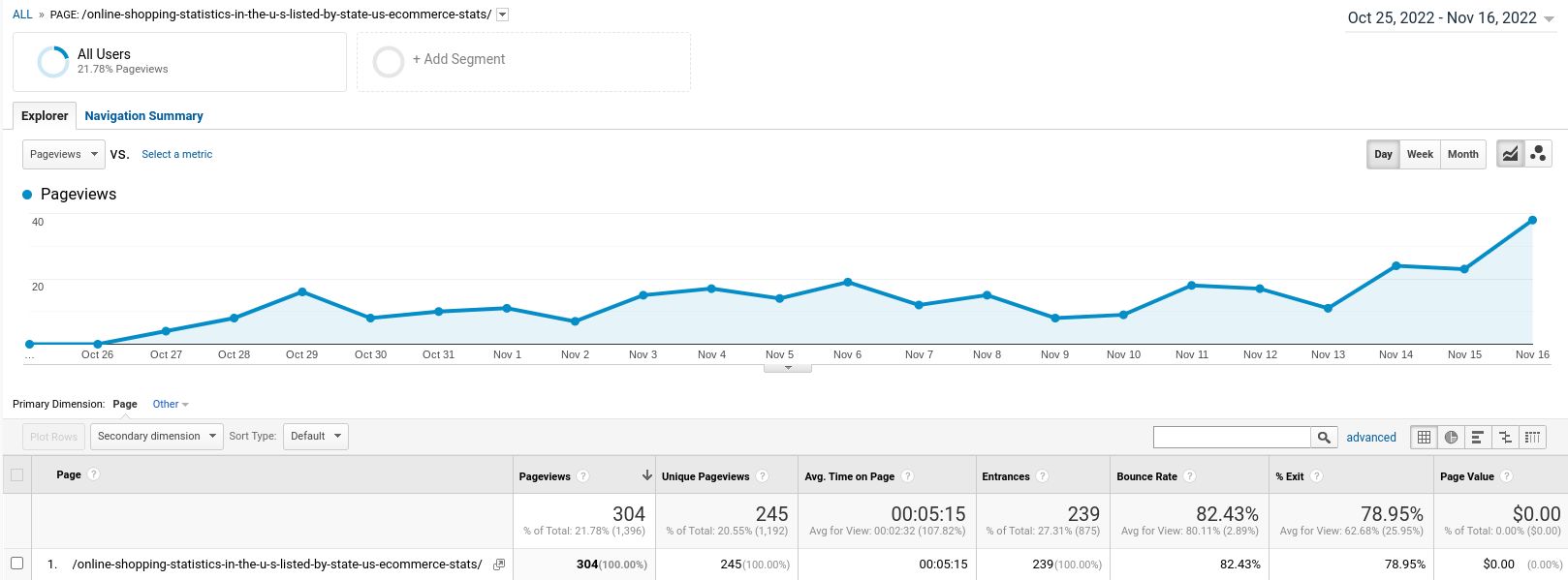
You can check it out here to see how we created ‘link-worthy content’ that just picks up traffic without additional effort. The heavy lifting went into the content writing, on-page optimization, fact-checking and quality control. Getting it right from the beginning generated the traffic results you see above just days after publishing.
You have to meet or exceed competitor averages in terms of content length, keywords, images, heading tags, topical authority and more. But you also have to write good shit that people actually want to read! And you need to cover the topic in depth on multiple pages to prove to Google you’re an authority on the subject. If you don’t have enough related articles to your primary keyword somewhere in your blog pages, you’ll find it difficult to rank in the top 10.
And no one buys services from a company on page 2, so you might as well go home and buy ads if your SEO sucks.
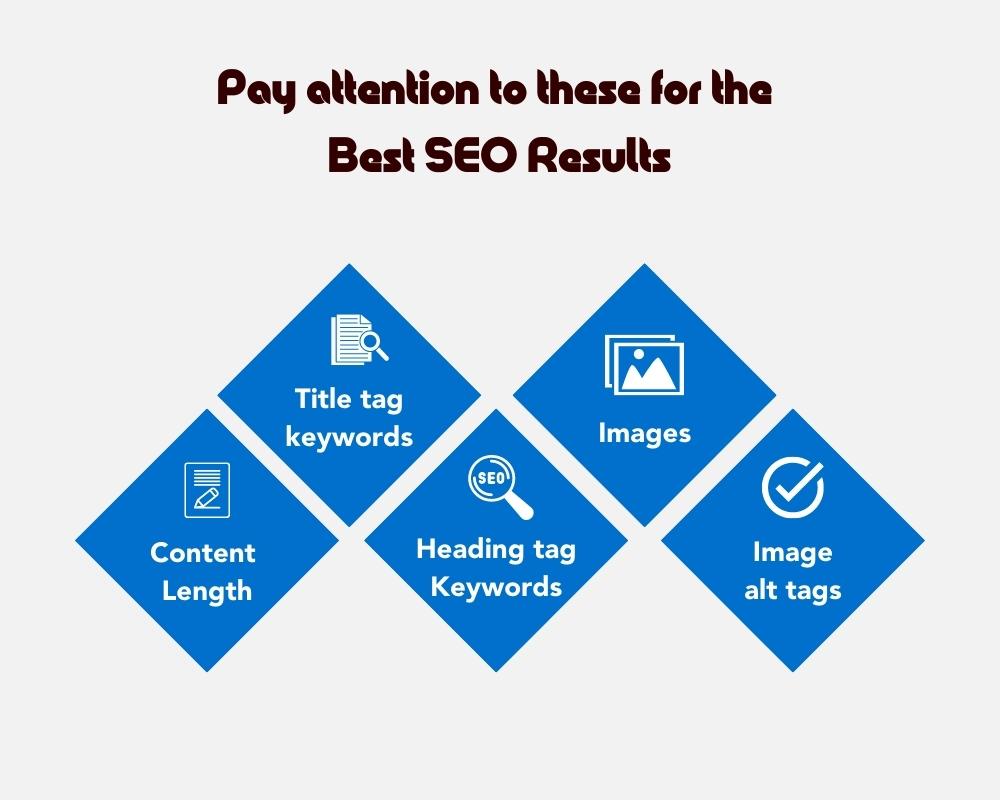
Blake’s Guide to Leveraging Content Marketing for the Best SEO Results
SEO takes time. Your website content is the most important part of it and if you really focus in on building the perfect page for a particular keyword, you can make amazing moves in search – with or without links.
You have to look at your competitor pages, run the math and then design something better. Start by looking at the top 10 results in Google and get their averages regarding:
- Content length
- Title tag keywords
- Heading tag keywords
- Images
- Image alt tags
Once you formulate those averages, you’ll have an exact blueprint to build the perfect page with content that’s almost guaranteed to rank highly in Google and other search engines. Just be sure to also mind your ‘authority’ signals and you’ll ‘pass go’ to monopolize Google in your niche.
Pay Attention to EAT and YMYL Content Tactics
Does your site have all the signals to tell Google you’ve been doing ‘white hat SEO’ or does your presence in search look like spam? Without going into too much detail on what Expertise Authority and Trust (EAT) or Your Money or Your Life (YMYL) has to do with your site, you should still remember that Google wants to design a user experience that only shows the absolute best content in their search engine. They want to rank ‘AUTHORITY’ sites…That gives them a platform they can sell a lot of ads around! Does your site meet the criteria they want to put their paid customer’s ad next to? Website quality is a tough metric to judge in any niche. So, how do they do it in a space where the wrong information can be dangerous to a person’s health and well-being such as finance or health?
They can’t look at a site and tell if it is legit or not without a human, so they rely on simple signals that a machine can understand like:
- Does the site have an About Us page
- Can I easily contact the business
- Is the content written by an author that can easily be found in search
A good SEO team will understand the ways Google can actually quantify these ‘EAT’ signals and adjust your site structure accordingly.
Do Your (Keyword) Research Properly
If you’re trying to master good SEO the first step is keyword research. If you don’t pick the right keywords your business will not show up for the right audience. A good SEO campaign starts with keyword research, but it doesn’t rely fully on search volume. Sometimes keywords with zero reported traffic are actually trending and worth building a page about as you saw above when we wrote on eCommerce stats. SEO has become a crowded space in recent years. A good SEO campaign will stand out from the crowd by finding trending keyword opportunities less experienced SEO teams missed.

Put Your Users First Like a Pro SEO News Reporter at SEJ
When you find a good topic related to keywords the competition missed, it’s time to write content that’s impossible to match and earn the rank you deserve in Google. You can add keywords to match competitor averages like I did with this page (see screenshot), but that won’t get you shit if your content doesn’t read well.
Find the best site in your space that consistently produces educational content and focus your website marketing strategy around similar content.
For us, it’s Search Engine Journal and similar publications that consistently report on Google. If we write each page to the highest editorial standards possible and approach our blog with the level of seriousness a media company would, we can showcase our business as a thought leader in the SEO space. And you can do it too no matter what niche you’re in! Find the best content from your peers and model your digital strategy around the best your industry has to offer.
In SEO, quality content is always the centerpiece of all our efforts. Everything else we do from links to website tuning is simply meant to get that content seen by the right audience. Focus on your content first, and all your other SEO efforts will pay off in the long run.

